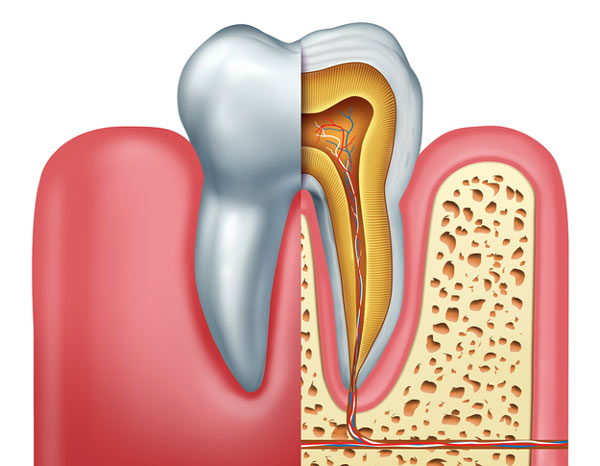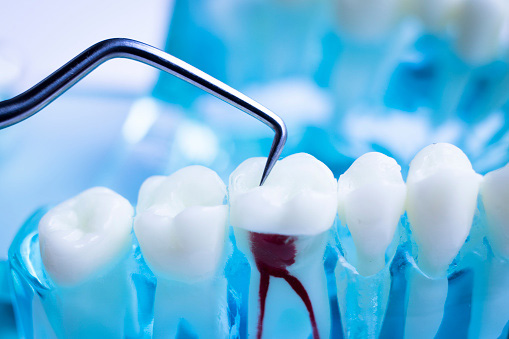 While most pain in your mouth will resolve on its own with a bit of at-home care, there are some warning signs that only the dentist or your physician should treat.
While most pain in your mouth will resolve on its own with a bit of at-home care, there are some warning signs that only the dentist or your physician should treat. These include sensitivity to hot or cold temperatures, swelling, bleeding gums, tenderness under one of your teeth, loose or cracked teeth, and pain when chewing food or biting down on an object.
This could be a sign that you are in need of endodontic therapy, also known as root canal treatment.
What Is Root Canal Treatment?
A lot of treatments we do in our offices work on the outside of your tooth.
However, root canals focus on the inside of your tooth.
The exterior or outside of your tooth is made out of dentin.
Dentin is made of a hard outer shell.
The inside of your tooth is called the tooth pulp.
Your tooth pulp has a lot of tissue, blood and your tooth nerves.
The inner tooth pulp ensures that your tooth functions properly.
The pulp works to keep your tooth healthy, which means that your gums and jawbones are healthy as well.
Because the tooth root connects your tooth to the jawbone, the roots are very important.
If you have a cavity, and you get it filled, your tooth will remain strong, especially if we catch it early.
When you have a cavity and you don't get it fixed, the cavity will continue to grow.
The cavity will grow larger and larger, and eventually it will reach your tooth pulp.
When that happens, your tooth can get incredibly painful.
The infection can also spread to your other teeth. Root canal therapy gives you the opportunity to have your tooth repaired and save it.

What Happens in Root Canal Therapy?
When you come in for a root canal, there is a process we have to follow.
First, we get x-rays of your tooth. That way, we can figure out how deep your infection is.
We will then numb the area where your tooth is so that you won't be in pain.
We will make an incision on the top of your tooth.
In order to treat your infection, we need to extract your tooth pulp.
We then double-check to make sure that your infection is completely gone.
We fill the space where your tooth pulp used to be, which means that your pulp is completely cleared of infection.
The composite filling that we use has antibiotic medication.
That way, the tooth will not get reinfected. We then crown the tooth so that we can make it as strong as it can be. We want to protect the tooth from breaking or cracking.
Do you have a tooth that is painful? Are you concerned that you or your child may need a root canal?
Our professionals also offer baby root canals. Give Grins & Giggles Family Dentistry a call at (509) 928-4746 to seek treatment right away.
Frequently Asked Questions
Does A Root Canal Hurt?
Modern root canal treatments are generally not painful and are comparable to having a routine filling. Local anesthesia is used to numb the area, making the procedure relatively comfortable. Post-treatment, some patients may experience mild discomfort, which typically subsides quickly.
What Happens After Root Canal Treatment?
After a root canal, the treated tooth is usually restored with a filling or crown to protect and strengthen it. It's common to have some sensitivity for a few days, which can be managed with over-the-counter pain relievers and proper aftercare with your dentist.
Who Needs A Root Canal?
A root canal is typically needed when the pulp inside a tooth, which contains nerves and blood vessels, becomes infected or inflamed. This can be due to deep decay, repeated dental procedures, cracks, or injury. Symptoms may include severe toothache, sensitivity, and swelling.

